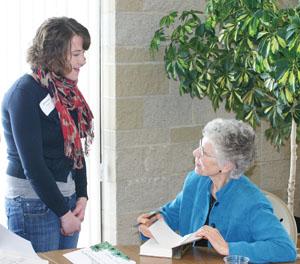
By Celine Klosterman
IOWA CITY — Troubles not only offer an opportunity for growth in faith, they’re necessary for spiritual transformation, according to Sister Joyce Rupp, OSM. Perspective, support and prayer can help one mature spiritually amid inevitable suffering, she told about 160 people at St. Patrick Parish Center on Feb. 26. She offered guidance during her presentation “Growing in Faith Through Difficult Times,” a day of reflection sponsored by the Davenport Diocese.
“I rarely meet a person free from suffering,” said Sr. Rupp, a writer, spiritual director and Des Moines resident. During times of trouble, people may wonder the same question her 12-year-old nephew asked after his grandfather suffered a brain hemorrhage: “Why is God doing this?”
Sr. Rupp tried to offer an age-appropriate response: “I don’t believe God causes suffering. Your grandpa’s body is wearing out. God is there with both of you and wants to comfort you.”
As her nephew’s question showed, “Pain makes theologians of us all,” the speaker said, quoting author and Episcopal priest Barbara Brown Taylor.
In both religion and nature, the “descent into darkness” is vital to growth, Sr. Rupp observed. Winter precedes spring; Egypt’s freed slaves wandered in the wilderness before finding the Promised Land; and Jesus spent 40 days in the desert before beginning his public ministry.
“The road to Easter morning goes straight through Good Friday.”
Lent is a time for us not to deny our suffering, but to carry our cross in a way that strengthens our compassion, Sr. Rupp said. Pain can enhance our kinship with and empathy for others.
Suffering also teaches us to lean on God. Romans 8:35 asks: “What will separate us from the love of Christ? Will anguish, or distress, or persecution, or famine, or nakedness, or peril, or the sword? … No, in all these things we conquer overwhelmingly through him who loved us.”
Even in times of anxiety, faith assures us better days will follow, Sr. Rupp said. The most-repeated phrase in the New Testament is “be not afraid.”
We want spiritual growth to be easy, she acknowledged. But “That which masquerades as a trial to my spirit today will dress as the teacher of my life tomorrow,” she said, quoting writer Mary Anne Radmacher. We may not know what that teaching is until our pain has ended, but we can trust the suffering will cease, Sr. Rupp said.
The speaker shared the example of a friend, Dorothy, who was diagnosed with Lou Gehrig’s disease, a terminal illness that gradually paralyzes all of a person’s voluntary muscles. “She went through such anger about it.” Eventually she called Sr. Rupp and, alluding to Jesus’ death, said, “I’m being handed over. I’ve accepted it.”
Dorothy died at peace. “But she had to go through her own agony in the garden to get there.”
In addition to speaking on faith, Sr. Rupp later shared eight aspects of hope. First, Christian hope has roots in Christ’s resurrection. In each Bible story in which people hear Jesus rose from the dead, they’re surprised. Similarly, we may not know what light awaits us at the end of our suffering.
Second, hope is resilient, enduring and adaptable. We all have an enduring evergreen inside us, Sr. Rupp said.
Third, hope requires patient waiting. “If you pull a plant up to see if it’s growing, it’ll be dead.” Waiting is difficult, but worthwhile. She spoke of a time when she planned to write some fellow Sisters a letter to convince them to accept renovations they opposed to their motherhouse. But an e-mail she received with a prayer for acceptance of “people I cannot change” made her abandon the letter. Nonetheless, the Sisters eventually changed their minds.
Fourth, hope asks us to let go. Trappist monk and writer Thomas Merton wrote that a green apple can’t make itself ripen overnight by “tightening its muscles.” Like the apple, “We must wait for God, we must be awake; we must trust in God’s hidden action within us,” he wrote.
Fifth, hope grows stronger with kinship. Church communities, friends or even one person can offer vital support, Sr. Rupp said.
Sixth, hope needs quiet reflection and prayer. Sometimes, people try to keep busy to distract themselves from pain. But they need a little solitude daily to work through emotional troubles.
Seventh, hope surprises us. Sr. Rupp said many attendees at her conferences have told her how much an unexpected note or card meant to them during a hard time.
Finally, hope asks us to trust a gift will follow our suffering. That gift may be compassion, increased empathy or something else, but it’s never just for us — it’s to help transform the world.
“I think in pain and loss, we do become more compassionate,” said Wilma McGrane, a member of St. Matthew Parish in Cedar Rapids, after Sr. Rupp’s talk. The presentation was “fabulous,” McGrane said. With regard to grieving, “I find her words very healing and easy to apply. She’s very inspirational.”
Mary Reichardt of St. Wenceslaus Parish in Iowa City plans to repeat a meditative exercise in which Sr. Rupp invited attendees to imagine their ancestors nearby. Reichardt’s mother died in January. The meditation “struck me very strongly. I really felt her presence. She’s here now and always will be.”








